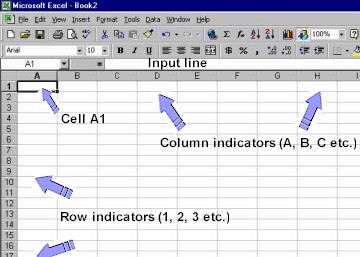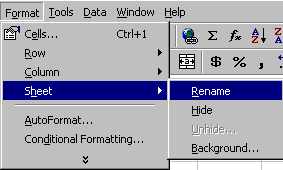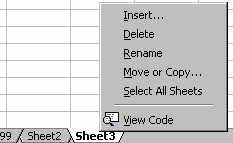|
Workbook
A spreadsheet document (or file)
is called a workbook. Therefore, when we
refer to Saving a file, we are saving the workbook. It is
just a matter of a name. A workbook is a document
and it is a file that gets saved to disk.
Initially, a workbook is labelled Book1 or Book2
etc (see the Title bar in the image below), until you save
it and give a name of your own.
When you open a workbook you will
see a page filled with rows and columns.
Rows are labelled
with numbers. There are 65 536 rows.
Columns are labelled with letters of the
alphabet. There are 256 columns.
A Cell is identified
by its row and column indicators. In the image below Cell
A1 is in Column A and Row 1. We normally
enter one piece of data in a cell.

When you open a new workbook, you
will see that it is not only a big sheet of many rows and
columns, but that it contains 3 worksheets (see below). Each worksheet contains
65 536 rows and 256 columns.

The Worksheets are labelled Sheet1,
Sheet2 and Sheet3, until you rename them. Normally you only
use one worksheet. You could use different worksheets, for
instance, if you want to keep one class's mark records over
several years in one document, or if you want to keep the
records of all your classes in one workbook. You would then
rename the sheets according to the years e.g. 1998, 1999 and
2000, or according to the classes e.g. Grade 8B, Grade 9A
etc.
How
to rename sheets
Click on the Sheet tab
at the bottom the page (circled above).
Then...
Click on Format
Click on Sheet
Click on Rename

Alternatively
Right Click the Sheet
tab
Click on Rename

When to use a workbook and when
to use a worksheet
The following extract comes from
www.ehow.com
A
"workbook" is a Microsoft Excel file. Each workbook
can hold many "worksheets" (individual spreadsheets).
Use multiple worksheets to group related data. For example,
you might have a sheet for each quarter's detailed budget,
plus a sheet for a streamlined version of the yearly budget.
You can reference cells in other sheets: your yearly budget,
for example, could reference data from the quarterly sheets.
The following steps work with Excel 97.
Steps:
- Use
multiple worksheets when creating spreadsheets for several
related groups of information.
- Don't
use multiple worksheets if your spreadsheets aren't related
- create a new workbook instead.
- Don't
use multiple worksheets to create "what if" scenarios
for the same group of information (for example, best case,
worst case, and most likely scenarios for one budget); use
the Scenarios command in the Tools menu instead.
- To
go to a new worksheet, click its tab at the bottom of the
spreadsheet window.
- To
use data from one worksheet in another worksheet's formula,
just select the cells you want to refer to and paste them
in the formula as you would other cells.
Tip:
If
sheets in your workbook will use similar formatting, you can
create the first sheet, then save it as a template and use
it as the basis for subsequent sheets. (Use the Save As command
in the File menu to save the worksheet as a template.)
|